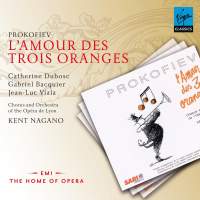PROKOFIEV The Love for Three Oranges – Nagano
View record and artist detailsRecord and Artist Details
Composer or Director: Sergey Prokofiev
Genre:
Opera
Label: Virgin Classics
Magazine Review Date: 12/1989
Media Format: CD or Download
Media Runtime: 101
Mastering:
DDD
Catalogue Number: VCD7 91084-2

Tracks:
| Composition | Artist Credit |
|---|---|
| (The) Love for Three Oranges |
Sergey Prokofiev, Composer
Brigitte Fournier, Soprano Consuelo Caroli, Mezzo soprano Didier Henry, Baritone Gabriel Bacquier, Baritone Georges Gautier, Tenor Gregory Reinhart, Bass Hélène Perraguin, Mezzo soprano Jean-Luc Viala, Tenor Jules Bastin, Bass Kent Nagano, Conductor Lyon Opera Chorus Lyon Opera Orchestra Michèle Lagrange, Soprano Sergey Prokofiev, Composer Vincent le Texier, Bass-baritone |
Author: Lionel Salter
Long, long before the formulation of the concepts of the Theatre of Cruelty and the Theatre of the Absurd, Carlo Gozzi had pointed the way in the plays he wrote around 1760 –Turandot, The stag king, The love for three oranges – which were designed as counterblasts to the realistic theatre of his fellow-Venetian, Goldoni. The last-named piece was a surrealist fantasy with satirical overtones, incorporating elements from various fairytales. Two and a half centuries later, Meyerhold seized on it in a magazine he was editing, lauding its wry humour, symbolism and absurdities in a reaction against Stanislavsky's naturalistic Moscow Arts Theatre; and a copy of this was in Prokofiev's luggage when he left Russia for the USA in 1918. Particularly attractive to him was its scenic and textual freedom, deploring as he did 'musical dramas fixed in a statue-like rigidity and weighed down with a thousand wearisome conventions...[such as] rhymed libretti'. After translation from the original Russian into French, his setting of Love for three oranges was produced in Chicago – after a delay caused by the death of the opera-house director who had commissioned it, but thanks to the support of Mary Garden - in 1921.
It certainly broke with the conventions: musically it has no set-pieces for the singers that can be wrenched from their context for concert-hall performance, and there is practically no development of themes in the work – in fact, the orchestral March and Scherzo (made famous in the suite from the opera) are the only elements that make reappearances; nevertheless the score bubbles with invention and high spirits, and despite its apparent brittle heartlessness it has an outstanding knack of limning a situation or mood in only a few bars. Dramatically too it is unorthodox: the course of the action is affected by the intervention of groups of 'spectators' (variously inclined towards tragedy, comedy, romantic pathos or just empty-headed fun); and it is thanks to this clownlike chorus that the princess who steps from the third orange does not, like her sisters, perish of thirst in the desert, and that the malevolent witch Fata Morgana (who, tumbling over, had at last caused the melancholy hypochondriac prince to laugh, and as a result has cast on him a love-spell for three oranges) is kidnapped as she is about to accomplish his ruin.
Unlike previous recordings of the work, this one, based on the stage production by Lyon Opera (but with a couple of cast changes), is sung in French and will thereby be comprehensible to more listeners, who moreover will also have at their disposal an extremely good (if at times overfree) translation and entertaining little cartoons of the characters in the story. One way or another, I am pretty sure that they are in for a thoroughly enjoyable experience, for by one of those rare concatenations of circumstances absolutely everything - performance, production, recording, presentation - has come out right. The new musical director of Lyon Opera, Kent Nagano, conducts with zest and finesse and is admirably served by his orchestra, who sound responsively on their toes and are balanced in such a way as to produce a satisfying sonority without ever overwhelming the singers. The cast could scarcely be better, with not a single weakness anywhere. Invidious though it may seem to mention only a few, Jean-Luc Viala is outstanding in both character and lyrical veins as the whining prince who is transformed into a questing hero, Georges Gautier is a tower of strength as the unhappy Truffaldino who first is given the thankless task of making him laugh and then has to accompany him on his adventures, Michele Lagrange is icily imperious as the wicked witch, and Catherine Dubose is vulnerably tender as Ninetta (surely one of the briefest parts in the whole operatic repertory for a heroine, and undoubtedly the only heroine to be turned into a rat for some of the time); and Jules Bastin contributes a telling vignette as the ogre's gigantic and ferocious cook who goes weak at the knees at the sight of a piece of pretty ribbon. Preposterous? Of course, like the oranges themselves; but great fun, and Virgin Classics have pulled it off triumphantly.
Explore the world’s largest classical music catalogue on Apple Music Classical.
Included with an Apple Music subscription. Download now.

Gramophone Digital Club
- Digital Edition
- Digital Archive
- Reviews Database
- Events & Offers
From £9.20 / month
Subscribe
Gramophone Club
- Print Edition
- Digital Edition
- Digital Archive
- Reviews Database
- Events & Offers
From £11.45 / month
Subscribe
If you are a library, university or other organisation that would be interested in an institutional subscription to Gramophone please click here for further information.






